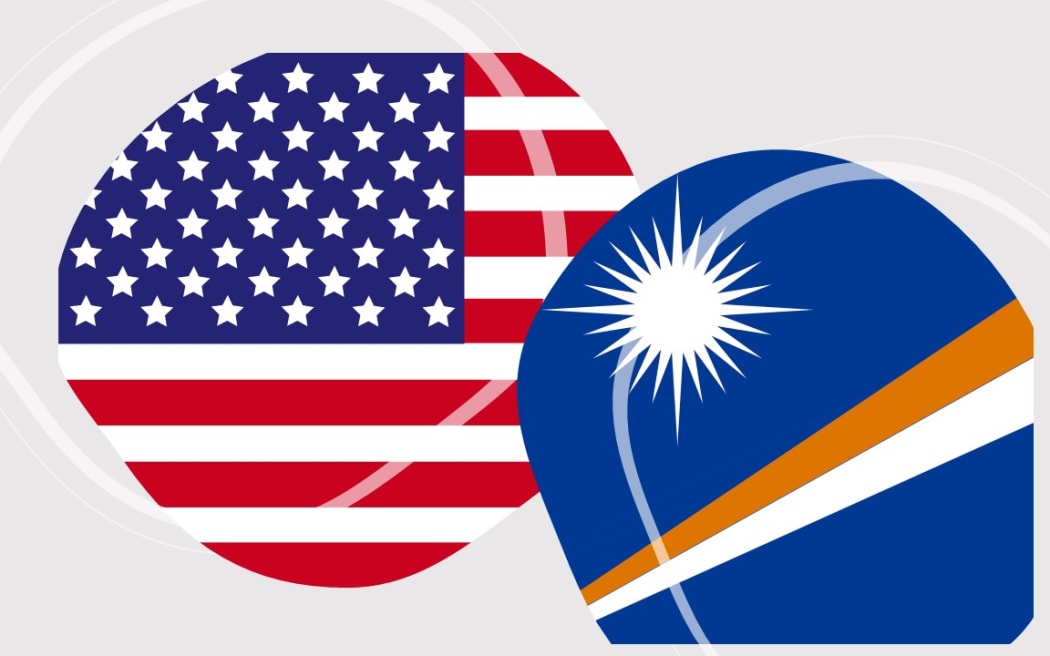
The Marshall Islands and the United States signed off on their Compact III agreement in Hawaii. Photo: RNZ Pacific
After months of back and forth negotiators from the Marshall Islands and the United States signed off on their Compact III agreement in Hawaii yesterday.
It is the final piece in Washington's compact puzzle in Micronesia with the other two freely associated states, Palau and the Federated States of Micronesia, having already signed their respective agreements earlier this year.
The combined total of the main elements of the compacts is expected to come to around $US6.5 billion over 20 years.
According to the US State Department, the Special Presidential Envoy for Compact Negotiations Joseph Yun signed the agreements for the United States and Minister of Foreign Affairs and Trade Jack Ading signed for the Republic of the Marshall Islands.
Marshall Islands President David Kabua, chief negotiator Phillip Muller, and several other senior RMI officials attended the signing in Honolulu, as did US Department of the Interior Assistant Secretary for Insular and International Affairs Carmen G. Cantor.
The three agreements signed in Hawaii which make up the Marshall Islands Compact of Free Association with the United States are:
A State Department spokesperson said the conclusion of these agreements affirms the close and continuing partnership between the United States and the RMI.
Nuclear legacy unresolved
RNZ Pacific's Marshall Islands correspondent Giff Johnson joined the livestream of the signing ceremony.
Despite all of the back-patting on the day, Johnson said it was evident from the statements made by Marshall Islands officials that the legacy issues relating to the US nuclear weapons tests have not been addressed.
"Both foreign minister Ading and the chief negotiator, Philip Mueller did raise the issue of the nuclear legacy...It's clearly not resolved, even though there's some ability of the Marshall Islands to use some of the money for nuclear related things. It's just not really clear," he said.
"And we haven't seen the documents, the black and white. So it's too early to really comment on what the specifics are. But it was definitely mentioned that this is the big issue for the Marshall Islands is resolving the nuclear legacy."
Johnson said stakeholders in Majuro that he has spoken to have registered surprise that the deal had been pushed through and will be very interested in seeing what has been agreed to in the "black-and-white" text of the agreements.
He said Marshall Islands government officials were likely to lobby Congress to try and get some traction on issues they have been unable to resolve with the State Department.
"They've gone as far as they can go. And now it goes to the US Congress, and the Congress has ability to change it. And they have changed past compacts in different ways.
"And so I know, the Marshall Islands has already been talking with people in the Congress about the things, the gaps, because they couldn't get it through the State Department. And I think they're hopeful that the Congress will address some of them.
"But I mean, the US Congress is a little bit in chaos, just at the moment. I mean, the world's in chaos. So getting people's attention to an agreement that's signed, may be a challenge."
Compact III a u-turn for Washington
The compact agreement signed by the Marshall Islands and the US this week is the third edition of the 20 year funding arrangements. The first lasted from 1986 to 2003 and this was followed by the one that has just expired this year.
But Johnson said up until quite recently the Federated States of Micronesia, Palau and the Marshall Islands had no guarantee that another 20-year-cycle would be forthcoming.
In fact, Washington had intended to end its funding arrangements with Micronesia this year, he said.
"Compact two, which came into force in 2003, ushered in an era where the freely associated states Palau, FSM, Marshall Islands, were just back burnered by Washington,
"And every State Department, person, ambassador, and whatnot, who talked about the 20 year agreement, said when this agreement expires in 2023, there will be no more US grant funding," Giff Johnson said.
Johnson said the US government said the reason that they were capitalizing trust funds for the Micronesian states was to provide them with money so that the could take on their own economic development and go from there.
"And that was the policy, the party line from Washington, for essentially, I'd say, 16 to 17 years."
Enter China
"Well, then along comes the China - US dynamic. And as it grew in importance, it was like Washington just did an about face,
"And in the second half of the Trump administration, Mike Pompeo, his Secretary of State, simply one day announced, right, we're going to have a third compact funding arrangement for all three."
And with the FSM and Palau already on board the signing with the Marshall Islands this week marks an important milestone towards that end both for Washington and the freely associated states who rely on the US funding.
In a statement released after the signing a State Department spokesperson outlined the next steps for the compacts.
"U.S. Congressional and RMI Parliament (Nitijela) action is necessary before the agreements can be brought into force, and we appreciate Congress's bipartisan and bicameral support on this matter."



